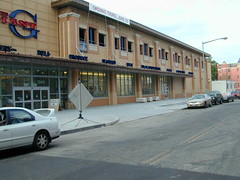Land of the Free and Home of the Timid?
 Illegal curb cut at Giant Supermarket, Tivoli Square, Columbia Heights.
Illegal curb cut at Giant Supermarket, Tivoli Square, Columbia Heights.I have been doing some drudge text entry from a couple decade old document that is about the history of early Washington, including the period before the United States was created, and it's incredibly fascinating to see how issues that concern us today were the same kinds of issues that were on the minds of people back then.
However, life then was a lot harder, and the inalienable right to buy cheap consumer goods wasn't foremost on people's minds. (Think back to the time when the Maryland Colony made Aglicanism the official religion, organized the colony into parishes, and taxed all households 40 pounds of tobacco/year to support the clergy and the construction of churches--this certainly puts the whole separation of church and state argument in perspective.)
 Don't Tread on Me ... because you're in the way of my SUV?
Don't Tread on Me ... because you're in the way of my SUV?Natalie Avery writes on the Columbia Heights email list--
Jay Philips argues that Giant and Horning Brother’s usurping of public space for a driveway at the new Giant is insignificant and not worth protesting. He then goes on to list some of the other serious negative repercussions of the city’s development policies as more worthy of picketing, including persistent homelessness, poor public schools and lack of affordable housing. I too wish there was more widespread and organized resistance to all the social ills and policy failures Jay Phillips lists. But I cannot agree that this particular episode is insignificant. Giant and Horning turned what could have been a vibrant, dynamic urban space into an ugly, unsafe parking lot. They did so illegally and in total violation of the public realm plan that dozens of residents and city workers spent countless hours crafting.
Beyond its trashing of promised public space, this whole episode sends a strong message both to other developers dealing with the law and with concerns of the local community and to residents hoping and trying to have a say in how the community would look and feel. It also says a lot about the competence of the regulatory authorities who were supposed to protect the integrity of our community’s public space.
Giant and Horning correctly assumed (as is apparent on this list) that, once they built the driveway, residents desperate for the store to open would resist any efforts to correct the situation, thereby giving political cover to weak city leaders who have acted with characteristic meekness in the face of this massive violation of public trust. Sure enough, the deputy mayor’s office has decided basically to let it go, forging a compromise that is only marginally better. Our city leaders once again sold out the interests of ordinary residents to multimillion dollar business interests. This latest episode follows the same vivid pattern of betrayal and weakness that infects our city’s urban development policy and practices.
This will only change if people start organizing and fighting for a more humane set of development priorities, more accountable leaders and stronger protection of the public interest. Where were the City’s regulatory authorities and leaders? After denying Horning’s application for permits to build the driveway, why didn’t they stay on top of the situation and stop it before the driveway was built - especially given the visible pace of construction at this stage? Their negligence has been devastating. It’s just one more example of the warped priorities of the William’s administration, the pervasive incompetence of DC’s regulatory authorities, and the widespread contempt city leaders have shown for ordinary residents - and even city planners - who were deceived into believing they actually had a voice in the urban planning process.
Rather than dropping this, as Jay Phillips suggests, this dreary incident may have benefits if it will galvanize some people to get more involved in building something better. Only then will we deal effectively with weak political leaders who speak out only for the highest bidder, with regulatory agencies staffed with incompetent cronies and with the general complacency of a discouraged citizenry. Otherwise, we are complicit in shaping a rather bleak future for our city.
This is the problem as I see it. It is disheartening to read posts decrying efforts to hold lawbreakers accountable. I believe it is important to keep fighting - and to continue making the linkages between this and the other issues that Mr. Phillips lists.



0 Comments:
Post a Comment
<< Home